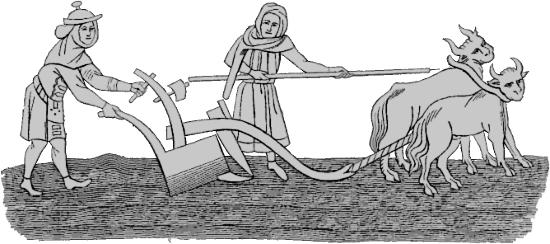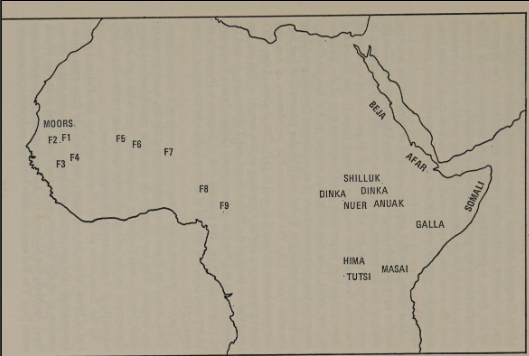This thread is all about your legal options if you were to travel back in time to medieval Europe and murder someone. It's also about measuring the decline of the extended family and the origins of English individualism. On Bertha Phillpotts' "Kindred and Clan in Past Time". 

Say as an example you traveled back in time to 14th century Sweden and murdered somebody. This is who and what you would have to pay: plaintiff 7 marks, King 4 marks, parents 2 marks, brothers 1 mark, 1st cousin 1/2 mark, 2nd cousin 1/4th, 3rd cousin 1/8th. 

The old Germanic name for this custom is wergeld. The wergeld gets mocked as barbaric, but understand that the fine to be paid was huge. In early laws it was often set at 200 gold solidi, which Seebohm thought was the equivalent value of 100 cattle, the original Germanic fee. 

The huge size of the wergeld fine implied that the killer would have a large extended family of cousins around to support him. Some laws even specified exactly how the fine was to be paid: in Lille the second cousin once removed of the murderer paid 3 sous and 9 deniers. 

Wergeld is a pagan custom and you might assume Christianity should have killed it. But wergeld for murder was banned in Denmark only in 1558 and even then Danes continued to blatantly ignore the law. This complicated legal ruling is from 1693: 44 people receive payment. 

44 cousins is a lot but not even close to the medieval record. In 1134 an Orleans deacon was assassinated: 240 of the murderer’s kinsmen assembled to pay homage to the deceased's family "of mouth and hands"- they clasped hands and kissed. 

Wergeld died out last in Scandinavia and this suggests that early modern Scandinavians must have been extremely immobile: how many of you have dozens of cousins living nearby? Think of their last names: everyone is identified as "son of blank" or by the name of the family farm.
Not everyone could muster up the wergeld fee and this meant vendetta, family wars. Unsurprisingly, 16th century Swedes were the most homicidal people in Northwest Europe, before undergoing a Japanese style “worst to first” transformation. 



Medieval homicide rates seem to have been highest in Italy, where vendettas sometimes erupted into gigantic pitched battles a la Gangs of New York. Families lived in fortified compounds: they even insisted on having their own churches to avoid being attacked after Mass. 

For medieval people feuds were an immutable fact of life: laws only tried to regulate them as if they were a sport. In Flanders the official feud rule book states that you need to give the other guy’s family two weeks warning before you start attacking his cousins. 

Before the advent of dueling Europeans did not seem to believe in the concept of a “fair fight". Pissed off gangs of Dutch brothers and cousins would happily execute the murderer’s uncle, his father, even beat up his elderly mother. 



There is one place in medieval Europe where vendettas were very rare and this is in England. As the English expanded into Wales and Ireland they swept away traditional homicide law as if it were barbaric but much the same laws prevailed in wealthy Flanders and Italy. 



Across much of Europe the aristocracy was actually more violent and prone to feud than the common population. Again, England is the exception. In James Givens’ huge analysis of 2,434 13th century murders not once was a lord or knight a victim or perpetrator. 

After the Norman Conquest, England held her captor captive: under the influence of English law William forbade feuding in Normandy and it seems to have worked. The decision to continue the vendetta in Flanders and Italy was a choice, not some medieval fact of life. 

Henri Madras once said of traditional France that “there are no friends in the countryside, only relatives or neighbors”. But this is clearly not true of 13th century England, because of all murderers with a known accomplice only 20% of the time is he a family member. 

Were the English really exceptional in choosing to kill with friends instead of family? I can't find any European data comparable to Givens', so I don't know for sure. But my impression from reading about Dutch homicide is that it is _very_ common for brothers to murder together 

What Phillpott’s book shows is that English homicide law had been unusually individualistic long before 1066. In the laws of King Edmund (939) the vendetta is already banned: "let him himself bear the feud". Thank God for the King, right? But the English were odd even earlier. 

The earliest English law to refer to wergeld is that of Aethelberht of Kent (c.600). Compared to the Continent the law is oddly simple: the slayer alone pays the fine (unless he runs) and there are no complicated rules dictating to whom it is paid. 
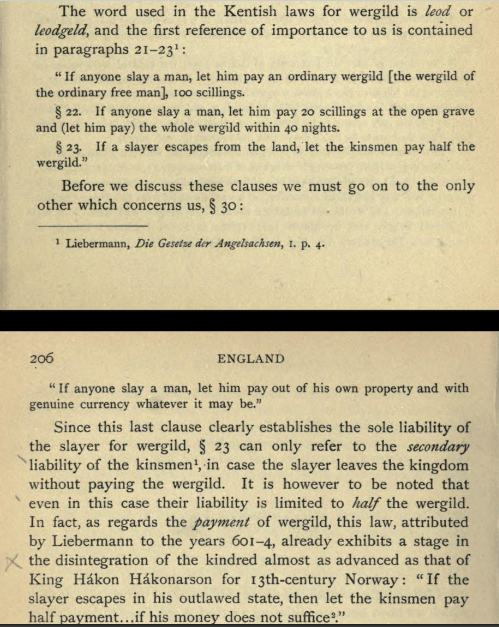
Even odder is the English version of the “Oath of Compurgation”. On the Continent this Oath was sworn by 12 kinsmen of the accused affirming his innocence; it survived in Denmark and Germany until the 16th century. Already in 7th century England the Oath was sworn by _neighbors_ 



Anthropologists have long been a bit baffled that Anglo-Saxons seem to have lacked a general word for “cousin”. The English had specific words for say “father’s brother’s son” but had no conception at all of 1st or 2nd cousins which made Continental wergild laws so complicated. 
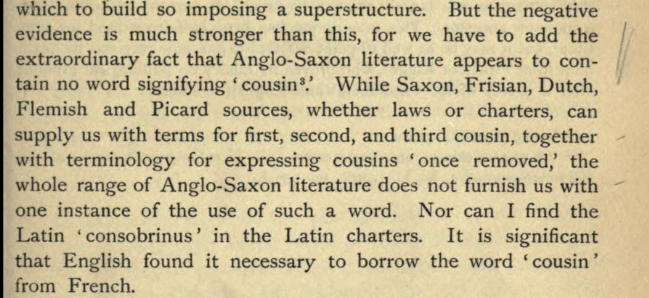
In Lorraine Lancaster’s reconstruction of Anglo-Saxon kinship terms there are a remarkable number of question marks e.g. there are no words at all to describe female cousins. It "suggests that these kin and the distinctions between them was not regularly of major significance". 



The English may not have strong enough families to properly feud. One of the earliest guild charters surviving anywhere is of a sort of vigilante's guild from Cambridge c. 990. Here the guild has totally usurped the role of the family in paying wergeld: friends pay for friends. 

Bertha Phillpotts had an idea of how this disintegration might have come about. To her, “The Origins of English Individualism” can be seen most clearly in the settlement of Iceland, the only other place in Europe where the extended family was so weak.
In theory wergeld in Iceland should have been regulated by the Norwegian Baugatal law which specified payments down to the 4th cousin. But in practice the fines were paid by individuals to individuals and practically any Icelander could pay fines on behalf of any other. 

The cumbersome old wergeld system was further rendered ridiculous by the habit of Icelanders to murder their own close kinsman. In a case like this (one of many), who pays wergeld to who? “Brothers will fight and kill each other, sisters' children will defile kinship.” 
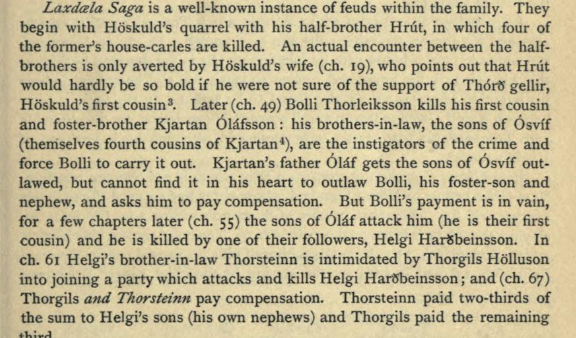
In Scandinavia there is a legal idea called odelsrett which holds that a man only gains the right to a property if his family has worked it for 6(!) generations; if it is sold kinsmen have the first claim. It is missing both from Iceland and England, likely for the same reason. 

Philpott’s explanation for this individuality is simple and convincing: the Landnáma details the Norwegian origin of the first settlers and it shows that neighbors often came from different counties. Even when brothers arrived together they often scattered to the wind on arrival 



Phillpott’s idea is that migration by sea is much more effective at disintegrating the extended family than large scale movements by land. In effect, the early migrations of the Icelanders and the English served to culturally “Americanize” them. 

I’ve seen this same idea about migration put forward in a different context by the archaeologist Helena Hamerow. The focus of settlement in all Germanic countries was the giant longhouse with 5-20 attached cattle byres, but in England longhouses were never built. Why? 



The ground plan of early Anglo-Saxon houses place entrances just as in the longhouse, as if they wanted to build them but couldn't. Hamerow believes they lacked the "social capital" to build such massive structures: their extended families had been destroyed by the migration. 



This is as close to an historical explanation of English distinctiveness as I’m ever likely to find. There are days I believe it. But on others I doubt and I start to think that maybe there is no neat explanation for English individualism, that it is simply inside them.
• • •
Missing some Tweet in this thread? You can try to
force a refresh

















